- Home
- Farley Mowat
And No Birds Sang Page 5
And No Birds Sang Read online
Page 5
There were few customers in the officers’ dining room when I swayed my way up to it in search of breakfast. Alex had made it, though barely, and his usually ruddy face was the colour of Gruyère cheese. He averted his eyes as a steward skated up and slapped a plate of boiled kippers in front of me.
“Sheer sadism!” he groaned. “Only the Limeys would play a rotten trick like that on a dying man... and, Squib, I’m dying certainly.” He slumped in his chair like a hung-over walrus, but even in the queasy grip of seasickness his presence still dominated the heaving room.
Beyond the ship the scene was something to behold. The sky was as harshly bright and clear as ever, for the sirocco brought no clouds in its train. The sun streamed down upon a waste of heaving seas, foaming white to the horizon. And the great invasion fleet—that irresistible weapon—was in total and almost helpless disarray. The largest warships were being swept by breaking seas until they looked like half-awash submarines. The big troopers were being staggered by the impact of the greybeards that broke over their heaving sterns. Most of the smaller vessels had turned about and were hove-to, head to the sea and wind, and some of them—particularly the square-nosed tank landing craft—were obviously nearing the limits of their endurance. If the gale had increased in strength only a little more, many of those metal boxes would have swamped and sunk. I thanked my stars I wasn’t aboard one of them... and then remembered that in less than twenty-four hours we were due to be cast into that turmoil of white waters in tiny assault boats which were little more than sardine cans and not much more seaworthy.
In mid-morning a blinker message flashed from the convoy command ship. Shortly thereafter we were told that, unless the weather had moderated by tea time, Operation Husky would be postponed. Those suffering the worst agonies of seasickness could hardly have cared less, but the rest of us were filled with gloomy forebodings. So far as we knew, our presence, or at least our intentions, remained unknown to the enemy. Surprise—that vital element of any invasion—presumably remained with us. But if we had to spend an entire day hovering off the coasts of Sicily, the enemy would be bound to discover us and to deduce where our thrust would be directed, and then we would become a dream target for German and Italian aircraft, subs and even motor torpedo boats.
“They’ll have to cancel the ruddy thing,” Alex grumbled furiously. “And then God only knows when we’ll get another chance to stick it to the Hun!”
However, shortly after 1600 hours the wind started to fall and by 1700 had practically dropped out. The great seas began to subside and at 2000 hours Park and I were called from admiration of a flaming sunset to be told that “the show was on.”
We three subalterns, together with our platoon sergeants and Company Sergeant-Major Nuttley, wedged ourselves into Alex’s tiny cabin while for the last time he went over the orders for the assault. Muted music from the BBC was playing on the public address system and with a start I recognized the repetitive strains of Ravel’s Bolero. I had not heard it since an evening in Richmond Hill shortly before sailing for England when, alone in an empty house, I had played the record over and over again to help assuage the misery of having been rejected by a girl with whom I thought I was totally in love. Her image came back to memory now, and I realized with faint surprise that I no longer gave a damn about her. I was wondering if I ever really had... when the music was abruptly stilled and the voice of the ship’s adjutant came booming in upon us.
“Do you hear there? Do you hear there? Serial leaders join your serials now... I say again... Serial leaders join your serials now...”
WHEN I REACHED the troopdeck I found most of my crowd lounging on wooden benches around the mess tables watching Corporal Mitchuk of No. 2 Section and some of his special cronies playing blackjack. A naked light bulb swaying over the table threw Mitchuk’s Slavic features into sullen relief. He looked what he was: a heavy-handed fighter who never knew when to quit. Next to him sat Ernie Thompson, number-one man on the platoon’s 2-inch mortar. Ernie, who was reputed to have been a Golden Gloves contender, had once spent sixty days in the Glasshouse—the dreaded British military prison—for knocking an officer unconscious during a pub brawl. I tended to treat him with somewhat exaggerated respect.
Looking and acting tough was de rigueur for most of the men of Seven Platoon, but not all were roughnecks. Sitting beside the card players because the light was better there, yet totally detached from them, Private A.K. Long was immersed in a limp, leather-bound volume of Shelley’s poetry.
A.K. was a conundrum. His elder brother was an officer in Dog Company and A.K. could have been one too, for he had all the right connections, but for reasons none of us could fathom he had chosen to remain a ranker who would not even accept a lance-corporal’s single stripe. He was the one man in the platoon I might have felt at ease with, but he remained as pleasantly aloof from me as from the rest of the platoon. Oddly, he was not resented, perhaps because of his almost feline air of intractable independence. It was this independent attitude which had led to his being banished to Seven Platoon; for although he was never impolite and was unfailingly gentle in his manner, if he did not choose to obey an order nothing in God’s earth could force him to it.
For a time I stood in the shifting shadows near a bulkhead—the ship was still rolling heavily—my presence ignored by everyone. I felt a need for reassurance and I looked toward two stocky, round-faced youngsters who sat together at the end of one of the tables. Sharon and Robinson might have been brothers, but were not. Two farm boys, they were the very stuff of which the Regiment was made, and from which it took the name by which it was known throughout the division—the Plough Jockeys. These two sat in easy and companionable silence, smoking slowly and thinking their own placid thoughts. I felt a wave of affection for them and wondered what witless military decision had doomed them to the Penal Platoon.
The click-snap of a rifle bolt being worked made me turn sharply. Tiny Sully was sitting on some crates in a dark cul-de-sac behind the companion stairs. Dim as the light was, I could see that he was holding his rifle with the muzzle resting on the toe of his right boot while he mechanically shoved the bolt home, pressed the trigger on an empty chamber, re-cocked the weapon and pressed the trigger yet again. In three strides I was beside him, hissing into his ear with a savagery I had not known I was capable of.
“Put that rifle down, you crazy little bastard! You shoot your toe off now and Mitchuk’ll put a bullet through your head! You don’t get off that easy.”
My hands were slimed with sweat and my legs were shaking as I turned away from him. I felt unutterably alone now—no part of this group of men in bush shirts and shorts sitting stolidly in the steaming fug of the mess deck waiting with apparent unconcern for the impersonal voice of the dispatcher to call our number—serial sixty-seven—over the loudspeaker.
“Do you hear there? Do you hear there? Attention serial seventeen. To your boat station move... Serial eighteen, stand by...”
In neighbouring Nine Platoon’s area someone was strumming on a Jew’s harp and a seaman was moving through the murk distributing cans of self-heating soup and bandying insults with the Pongos—derogatory Royal naval slang for soldiers—in a flat, cockney whine. Gratefully I saw Al Park beckoning to me. As I made my way toward him, I thought how out of place he looked in our grimly military assemblage. Gawky, loose-limbed as a stork, his stovepipe shorts and flapping bush shirt gave him the appearance of a cartoon Boy Scout. But if he realized how odd he looked, it did not bother him. Nothing much seemed to bother Al whose sense of the ridiculous foreshadowed the advent of Woody Allen. Together we stumbled and slid through the cramped company area, checking the gear and kit for the umpteenth time without really being aware of what we were doing.
Something skittered away underfoot and Al thought it was a mouse. For a few minutes we were diverted as I reminded him of the Intelligent Mouse which had shared quarters with us at Darvel and had become so familiar that, one Saturday night, it crawled into a
nearly empty mug of rum and got itself besotted. Al put it tenderly to bed in a cardboard box full of Alex Campbell’s khaki ties, and we forgot about it until next morning when Alex started fumbling for a tie to wear on Church Parade...
“... Attention serial forty-five. To your boat station move...”
“Getting closer,” Al muttered. “Best get back to my brood.”
Alone again I looked at my watch: 0015 hours. I wondered what was happening outside the ship. My thoughts hovered uneasily over the plaster map model. Were the enemy gunners sleeping in the machine-gun post on the point of land called Grotticello, which dominated our beach? Or were they gazing tensely across the phosphorescent shimmer of the heaving sea toward an alien shadow in the south? Was one of them even now ringing the field telephone that linked him with his headquarters? Perhaps the call had already been made! Perhaps the engines of Savoia-Marchettis and Junkers 88s were already roaring into life on Pachino airfield... My bowels began to constrict...
“... Do you hear there? Attention serial fifty-two...”
There was a stir at the far end of Troopdeck B as men of the 48th Highlanders began scrambling to their feet, adjusting their web equipment, picking up their rifles, Sten guns, mortars and Brens. An officer’s voice, high-pitched and querulous, cut through the murk. Ernie Thompson looked up from his cards and casually acknowledged my presence.
“How much time we got, Skipper?”
“Ten minutes maybe,” I replied in a voice marshmallowy with gratitude. He had called me Skipper!
He grunted and dropped another shilling in the pot. The game went on...
“... Serial sixty-seven... Serial sixty-seven, stand by...” Mitchuk flung his hand over his shoulder. “Fuck this,” he shouted as the cards fluttered to the greasy deck. “I fold!”
One or two men laughed in a brief, constrained way and then they were all on their feet, groping for their gear, shoving into position.
“... Serial sixty-seven. To your boat station move...”
The platoon lined up in single file. Doc’s fingers were hooked into my web belt and the rest of the men following behind were linked to him in the same manner. Platoon linked to platoon until the company coiled in and out behind me like a great serpent.
Alex appeared alongside. “All right, Squib. Let’s get going!”
We shuffled up the companion stairs and into the thick darkness of a corridor. A blue-hooded flashlight shone briefly on another column converging from a side passage to join the slow stream flowing toward the upper decks. The men were faceless and indistinct, like figures in some sombre dream. The light went out and I thrust a hand ahead of me as if to cleave my way through a darkness that was palpable. There was no sound except the hissing of heavy breathing and the gritty slither of iron-shod boots on steel plating.
Suddenly fresh air was riffling over my sweaty face. A door opening framed a starlit sky that was so brilliant compared to the stygian gloom from which we were emerging that it seemed dazzling. We moved more rapidly along the open deck to our designated landing craft which was swaying in its davits like a monstrous, ugly cradle dangling between wind and water.
I stood aside as the men began clambering over the rails, staggering under the battle gear that weighed them down like beasts of burden. When the last had fumbled his way to a place on one of three long benches running the length of the craft, I realized I had not seen Tiny Sully.
“Where’s Sully?” I demanded urgently.
Someone in the dark belly of the landing craft made a lugubrious, gasping sound and once again I felt my bowels constrict. Then came Sergeant Bates’s contemptuous voice:
“He’s here, the little shit!”
I had barely reached my place in the bow when the night was shattered by an infernal clamour as all the winches on Derbyshire’s deck began to clatter in unison and thirty landing craft descended toward the sea below.
We hit the water with a resounding splash, then lurched violently against the mother ship with a clangour of steel on steel that made me cringe in fearful certainty that the sound would be heard in Pachino itself. Our Royal Navy coxswain, holed-up in a tiny armoured cubbyhole on the starboard bow, cursed viciously, swung the helm hard over and rammed down the throttle. Someone cast off the falls and we swung bucking and jolting into the muttering darkness.
There were perhaps four hundred vessels of every size and shape gathered at our rendezvous some seven miles off the coast of Sicily, and the muted putter of their engines blended into one pervasive rumble as if of some uneasy giant in restless sleep.
Standing in the bows beside the coxswain’s cubbyhole I could just manage to peer over the high gunwales. The night was full of looming shadows, and the heaving waters were patterned with the glimmering phosphorescent wash of unseen boats. A sudden lurch caught me off balance and I stumbled back into the lap of Corporal Hill who, as if this had been some awaited signal, was immediately sick all over my back and shoulders. His example was infectious and men were soon retching their hearts out from one end of the boat to the other. I clawed my way back to the rail and fought my own rising nausea by staring fixedly at a pinpoint of green light on the stern of some unseen craft ahead of us.
Rupert Brooke’s “A Channel Passage” came unbidden into mind and I remembered his remedy for seasickness—think hard of the girl you love: Now there’s a choice—a sea-sick body, or a you-sick soul!
“You fucking cow!”
The cox swore stridently as the boat breasted a heavy sea and fell off sideways into the trough.
“You she-bitch female fucker!”... whereupon he too was sick.
The interior of the boat was becoming something of a shambles.
As she pitched and yawed, the mass of men slid helplessly up and down the benches, their feet in a broth of their own vomit. Some were pleading with me to let them go to the gunwales; but I dared not even let them stand, for assault landing craft were notoriously unstable in rough water and could easily turn turtle if the weight shifted from one side to the other. To my surprise I found myself taking real command of my platoon for the first time.
“Don’t anyone bloody well move,” I shouted over the guttural roar of the diesel engine, “or we’ll all be in the drink, and it’s too damn far to swim!”
Nobody made a move to disobey me, perhaps because they were too sick; and I was feeling rather marvellous until the cox reached out of his cubby, caught my arm and pulled me close.
“We’re fucking well lost, ducky! Can’t find no bleedin’ marker buoy! Wot yer wanter do?”
He had been searching for a floating marker that bore coded lights—blue over white over blue—the rendezvous point from which we were to steer a compass course to our designated beach. Without that fixed departure point we were lost indeed. And since my boat led the company, mine was the responsibility.
Panic engulfed me. There was nobody I could call on for help. In the first glow of the false dawn I could just make out the box-like shapes of the other two craft dimly visible astern. I glanced at my watch and saw that zero hour was only minutes away. There was no time, nor was this heaving ocean the place for a conference!
Frantic, I tried to guess where we might be. Dead reckoning might have given a real sailor some clue but I had never been more than a playtime sailor. The eastern horizon was rapidly lightening. The balloon would be going up any moment now! I swallowed hard, and in a voice that shrilled like a tin whistle gave the cox an order.
“Steer 340 degrees!”
It was the proper course (indelibly fixed in my memory) but only if followed from the correct departure point.
Obediently the little vessel swung off and headed for the unseen land. Moments later a necklace of bright-red jewels floated eerily into the northern sky off our starboard bow. The first enemy gun had opened fire! From the stern I heard Bates bawl: “There goes the ball game, boys!”
Idiotically I bellowed back: “Take cover, men!”
Then the waning night was rip
ped asunder by such an eruption of sound and fury as might have marked the world’s beginning... or its end.
HMS Roberts had triggered the opening of the naval barrage with a full broadside. Four incandescent spheres burst from her suddenly revealed grey bulk—four suns, rising with the speed of thought, that seemed to ignite the whole arc of the southern horizon in flickering red and yellow lightning as squadron after squadron of warships opened fire. It took perhaps three seconds for the sound to hit us and then we were cowering below the gunwales, hands over ears, as cataclysmic thunder overwhelmed our world.
I saw the cox beckoning urgently. Even with his mouth hard against my ear I could barely hear him shout.
“Yer want me to tike ’er in? Too bleedin’ ’ot out ’ere!”
Dawn was breaking and a low, pale shoreline was emerging into view a mile ahead of us. So close to it that they seemed to be on the yellow beaches, a pair of shoal-draft support craft were racing along laying a billowing smoke screen to hide us from the enemy. I scanned that formless strip of land with agonized intensity, desperately hoping to recognize some landmark. Nothing looked familiar, but there seemed to be a spit of land off to our right and I prayed it might be the one which marked the Regiment’s left boundary.
“Steer to the right of that point!” I screamed to the cox just as a salvo of Roberts’ 16-inch shells passed directly overhead like a hundred express trains roaring through some titanic tunnel.
The cox nodded grimly and opened the throttle. The boat reared back, digging her stern into the swells. A glance astern showed our two sister vessels following in arrowhead formation. I could see Alex standing in the bows of the starboard one, bull head thrust forward under his ridiculously small steel helmet. He was cradling a Bren and firing brief bursts toward the shore. As if in answer, streams of tracer began to arch toward us from a red-roofed building on a knoll a few hundred yards inland from the beach. I ducked as tiny spurts of water stitched between Alex’s boat and mine. Hunched against the landing ramp I waited, revolver clenched in sweating palm, for the grinding moment when we would hit the beach.

 Owls in the Family
Owls in the Family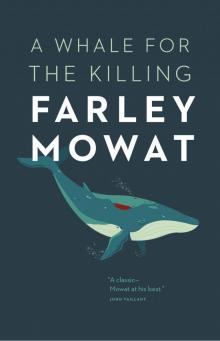 A Whale for the Killing
A Whale for the Killing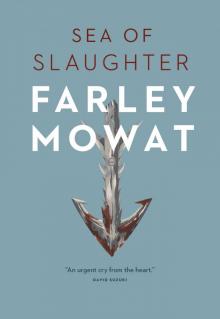 Sea of Slaughter
Sea of Slaughter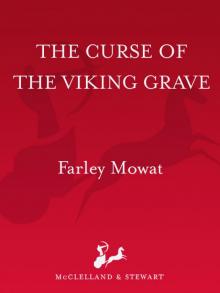 The Curse of the Viking Grave
The Curse of the Viking Grave The Boat Who Wouldn't Float
The Boat Who Wouldn't Float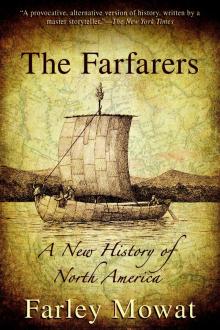 The Farfarers: Before the Norse
The Farfarers: Before the Norse Memoir
Memoir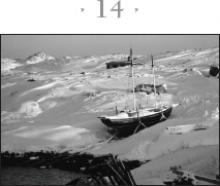 Bay of Spirits: A Love Story
Bay of Spirits: A Love Story The Black Joke
The Black Joke Sibir: My Discovery of Siberia
Sibir: My Discovery of Siberia The Dog Who Wouldn't Be
The Dog Who Wouldn't Be Never Cry Wolf
Never Cry Wolf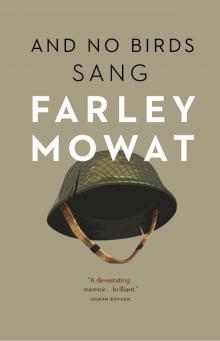 And No Birds Sang
And No Birds Sang The Snow Walker
The Snow Walker Born Naked: The Early Adventures of the Author of Never Cry Wolf
Born Naked: The Early Adventures of the Author of Never Cry Wolf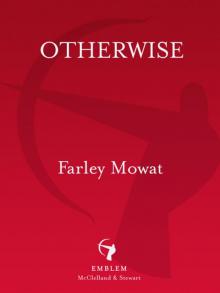 Otherwise
Otherwise Lost in the Barrens
Lost in the Barrens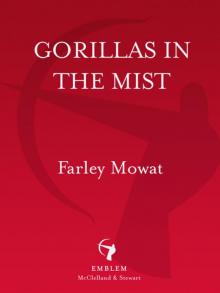 Gorillas in the Mist
Gorillas in the Mist People of the Deer
People of the Deer Eastern Passage
Eastern Passage Sibir
Sibir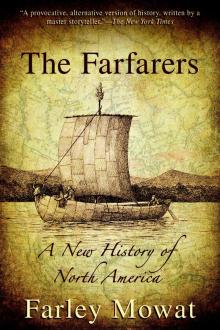 The Farfarers
The Farfarers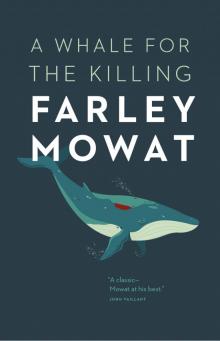 A Whale For The Killing (v5.0)
A Whale For The Killing (v5.0)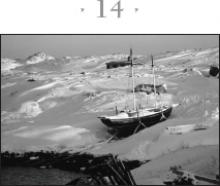 Bay of Spirits
Bay of Spirits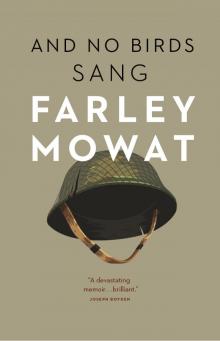 And No Birds Sang (v5.0)
And No Birds Sang (v5.0) Born Naked
Born Naked